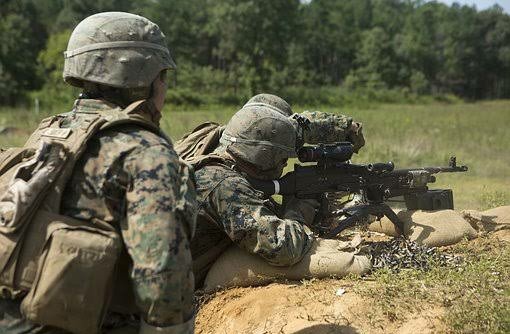 (License: Public Domain]:
Pixabay
(License: Public Domain]:
Pixabay About two weeks ago or thereabouts I received a call from my cousin in the Nigerian army and from the way he sounded on phone, I knew he was confused and unhappy. As a matter of fact he just got back from the bloody Boko Haram insurgency (in Metele, Borno State) that claimed the lives of most of his colleagues. From what he told me earlier on, he was actually planning on enjoying the yuletide and new year celebration with his family. However, this wasn't going to happen. He got a letter stating his immediate redeployment to Yobe; a State currently facing security challenges.
Going to Yobe wasn't really an issue for him; rather, his main problem was how he'll relate the sad news to his family and their possible reactions. Well, even though I don't exactly understand what it's like to be in the battle field or have a gun fired back at me, all I do know is that these people go through hell for the good of others. Aside from hunger, harsh weather conditions and several other wretched factors, they sometimes pay the supreme price. Unfortunately, despite their selfless services, most of them arent known or appreciated. That notwithstanding, this does not change the fact that they're heroes.
Introducing... Heroes of the biological system
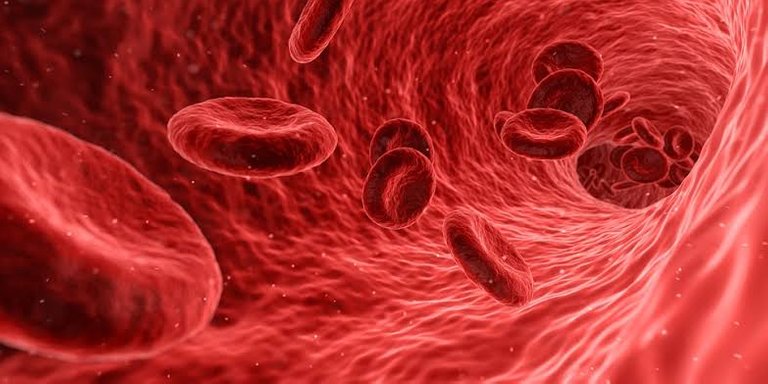.jpeg) (License: Public Domain]:
Pixabay
(License: Public Domain]:
Pixabay Just like any country's military forces; in humans, there are cells present in the blood tissue that constantly act as defense against biological intruders or invaders such as pathogens and micro-organisms. As we all know, the basic aim of these invaders in the body is to weaken the immune system of an individual thereby triggering various forms of ailments. With that being said, it's pertinent to pinpoint that out of the million cells present in the body, the only ones whose characteristics are directly linked with defense mechanisms are the white blood cells (WBCs). Unlike the red blood cells (RBCs), the WBCs are of different types which include neutrophils, eosinophil, basophils, lymphocytes, and monocytes. Their uniqueness is based on the fact that they also perform distinguishable functions. For example, out of the listed types of WBCs, neutrophils and monocytes are considered to be phagocytic. They help in removing the 'non-self' from the 'self'. According to Thesaurus.com
Non-self is any of the antigens present in an individual that originate outside the body.
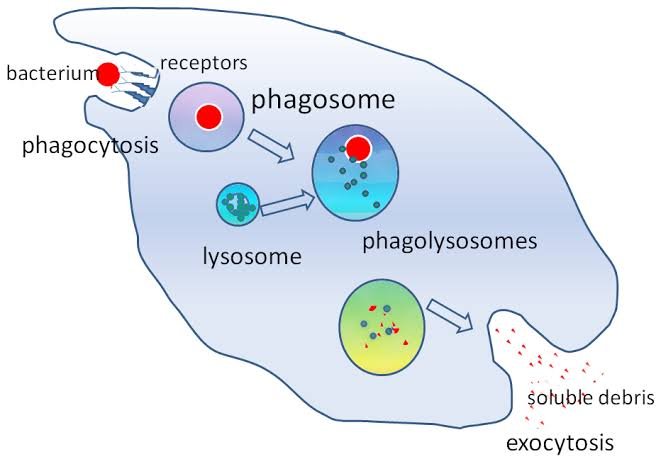.jpeg) Removal of an invading bacterium through phagocytosis (License: CC BY-SA 3.0, Author: GrahamColm]:
Wikipedia commons
Removal of an invading bacterium through phagocytosis (License: CC BY-SA 3.0, Author: GrahamColm]:
Wikipedia commons Actually, once these foreign invaders pass and penetrate through the skin (which act as a mechanical barrier), gastrointestinal tract, or respiratory tract, the lymphocytes responds immediately by mobilizing neutrophils and monocytes to arrest; engulf and kill them. From what we've discussed so far, we can refer to neutrophils and monocytes as biological cleaners. Furthermore, the ability of these phagocytic cells to recognize 'non-self' is due to the possession of a specific feature called innate receptors.
According to several studies, it's believed that each biological invader has a molecule (antigen) on its surface that's entirely different from the surface molecules found on normal cells. As a result of this, the danger signal is triggered in the process and the neutrophils and monocytes are attracted to the sites where these invaders are present. The next thing that happens is that they flow around (engulf) these invaders and enclose them in phagocytic vesicles called phagosomes, hence preventing them from escaping. For those that have basic knowledge on elementary biology, you'll agree with me that how these phagocytic cells rid the body of micro-organisms is quite similar to the feeding mechanisms amongst protozoans (such as amoeba and paramecium).
True heroes don't mind putting their lives on the line for the good of others
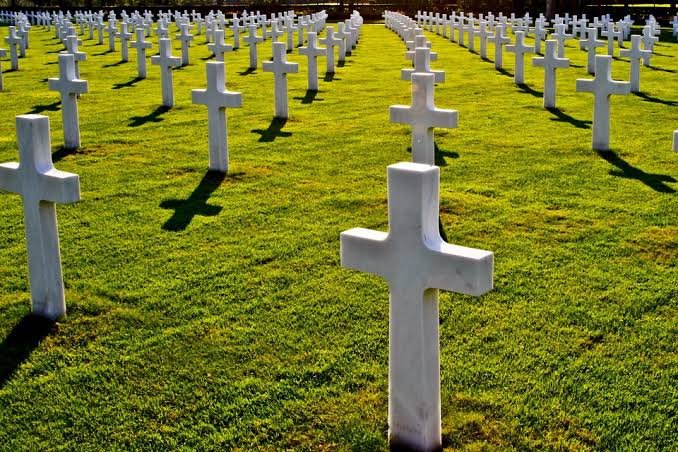.jpeg) (License: Public Domain]:
Pixabay
(License: Public Domain]:
Pixabay Personally, the processes whereby phagocytic cells engulf and destroy all manner of invaders have always been an intriguing concept for me. Lets bring it closer to ourselves. As awkward as it may sound, it's just like someone knowing too well that the food is poisoned and then tries getting rid of it by ingesting it. Sounds crazy right?. But in actuality this is exactly what the neutrophils and monocytes do. Since most cells are basically composed of organelles, the phagocytic cells have lysosomes, a structure derived from Golgi apparatus and which contains digestive enzymes. As we all know, the major role of digestive enzymes is to break down food. From our earlier statement, "the trapped invaders are prevented from escaping by the phagosomes". In addition to this, for the invaders to be destroyed, the lysosome must fuse with the phagosome resulting in a structural component called phagolysosome.
How the destruction occurs is that during this fusion, the digestive enzymes present in the lysosome are emptied into the phagosome. Now, the enzymatic reactions that are initiated inside of the phagosome will only consider the invaders as food and therefore will break them down. However, just like insurgents retaliate and fights back in this part of the world, most biological invaders have special and effective mechanisms that frustrate their destruction. For instance, if the invader was a bacterium, it might resist the immune response by releasing toxins called leukocidins.
With that being said, it's worthy of note that although neutrophils and monocytes perform similar function, it's the neutrophils that are usually the first responder whenever there's biological attack. So in cases where the invaders prove stubborn by releasing toxins, the types of phagocytic cells that are mostly affected and sometimes killed in the process are the neutrophils.
Based on scientific research, the reason why neutrophils die easily while combating biological invaders is that unlike the monocytes, they cannot renew their lysosomes. Since the lysosome is the cellular structure that's used in the phagocytizing process, it must be constantly renewed in order to be efficient in destroying the invaders. When this is not done, the reverse will definitely take place. The toxins that are released by the invaders will eventually render the neutrophils vulnerable. All the same, despite being killed by toxins, even in their death neutrophils prevent these invaders from escaping by forming viscous pus
Final thoughts
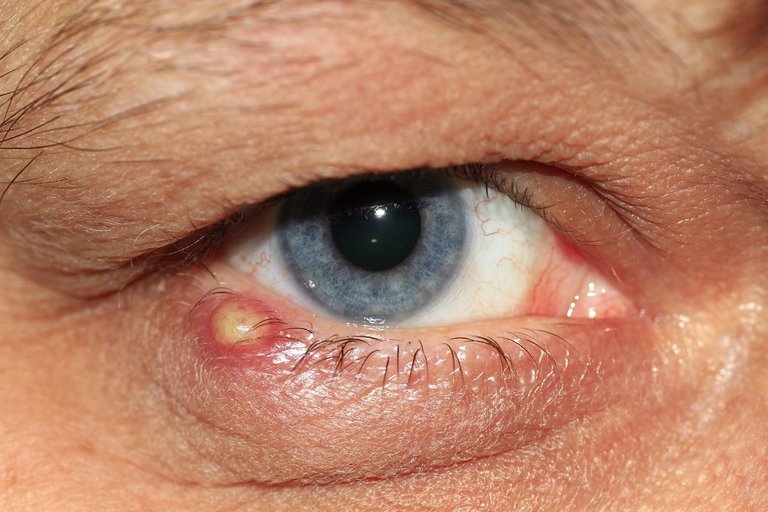 (License: Public Domain]:
Pixabay
(License: Public Domain]:
Pixabay The appearance of pus on the skin might seem a little disgusting, but the truth is that it's the cemetery of fallen heroes (neutrophils). From all we've discussed so far, you'll agree with me that even though neutrophils can't effectively deal with biological invaders or dead cell debris (like the monocytes), they still play a very vital role in the maintenance of immunity. I sincerely hope you've learned something from this article. Thanks for doing this with me. Till next time!
To read more about this topic, check out these REFERENCES
White blood cell from wikipedia.org
What are white blood cells?. Retrieved on 3rd January, 2019
Types and function of white blood cells (WBCs). Retrieved on 3rd January, 2019
Phagocytosis from wikipedia.org
Phagocytosis. Retrieved on 3rd January, 2019
Berg, J., Tymoczko, J. and Stryer, L. (2002). Biochemistry, (5th Edition). New York : W H Freeman, pp. 1338-1342.
Chatterjea, M. N. (2012). Textbook of Medical Biochemistry, (8th Edition). New Delhi: Jaypee Brothers Medical Publishers, pp. 110 - 115.
Vasudevan et al., (2011). Textbook of Biochemistry, (6th Edition). New Delhi: Jaypee Brothers Medical Publishers, pp. 553-554.
Images are from pixabay and wikipedia commons all licensed under creative commons and eligible for commercial use.
This post has been voted on by the SteemSTEM curation team and voting trail in collaboration with @utopian-io and @curie.
If you appreciate the work we are doing then consider voting all three projects for witness by selecting stem.witness, utopian-io and curie!
For additional information please join us on the SteemSTEM discord and to get to know the rest of the community!
Thank you. I really appreciate your support.
Congratulations @yhubi! You have completed the following achievement on the Steem blockchain and have been rewarded with new badge(s) :
Click here to view your Board
If you no longer want to receive notifications, reply to this comment with the word
STOPHi @yhubi!
Your post was upvoted by Utopian.io in cooperation with @steemstem - supporting knowledge, innovation and technological advancement on the Steem Blockchain.
Contribute to Open Source with utopian.io
Learn how to contribute on our website and join the new open source economy.
Want to chat? Join the Utopian Community on Discord https://discord.gg/h52nFrV
Thanks so much for your support. I appreciate
You've received 100% upvote from @cutymeni for this post. Keep it up!👏👏
Thank you boss
I'm sorry I missed this post, but upvoted your blog on faith to compensate :)
This is very informative. Understanding how the immune system "sacrifices" itself to protect us is fascinating.
I do hope your cousin is well.
Yeah, he's perfectly OK. I actually spoke with him this week on phone. Thanks for stopping by, I really appreciate